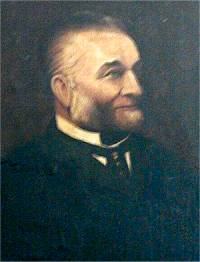Peter Lalor (1827-1889) - From Radicalism to Conservatism
Peter Lalor was born in Queens County, Ireland in 1827. His father was a member of the House of Commons. Peter was one of ten brothers. One of his brothers, Patrick, was involved in the failed 1848 rebellion in Ireland, he was jailed because of his participation in the rebellion and died in 1849 of tuberculosis. Peter, a civil engineer, migrated to Victoria in 1852 and worked as an engineer on the Melbourne-Geelong Railroad. He moved to the goldfields in Ballarat in 1853. He did not come to the fore in the Eureka movement till the meeting that was held on Wednesday 29th November at Bakery Hill, when he moved a resolution to turn the Ballarat Reform League from an ad hoc to a permanent organisation.At 10.00am on Tuesday 30th November, the police conducted a particularly viscous licence hunt at Ballarat in which eight miners were arrested. The miners gathered at Bakery Hill, Peter Lalor mounted a stump and took command. The Southern Cross was unfurled and about 1000 miners marched to the Eureka site. At a meeting of a dozen captains of the miners, Peter Lalor was elected as commander in chief.
 At 4.45am on Sunday 3rd December mounted police and soldiers attacked the stockade. Lalor took command. Standing on an exposed mound, he ordered the miners not to fire until the police and troops were at close range. He then ordered the pikemen forward. Just at that moment, a musket ball and two bullets struck him in the left shoulder. Realising the battle was lost, he ordered the miners to flee. He was picked up from the ground and was hidden in a woodpile. Later that morning, Lalor was spirited away by supporters. That evening he had his left arm amputated at the shoulder joint without the use of anaesthetics.
At 4.45am on Sunday 3rd December mounted police and soldiers attacked the stockade. Lalor took command. Standing on an exposed mound, he ordered the miners not to fire until the police and troops were at close range. He then ordered the pikemen forward. Just at that moment, a musket ball and two bullets struck him in the left shoulder. Realising the battle was lost, he ordered the miners to flee. He was picked up from the ground and was hidden in a woodpile. Later that morning, Lalor was spirited away by supporters. That evening he had his left arm amputated at the shoulder joint without the use of anaesthetics. The rest is history. He stood unopposed and was elected to represent Ballarat at the Legislative Council. The electors lost faith in his abilities when he voted that a property qualification be imposed on electors. He did not seek re-election in Ballarat but stood for the seat of Grant in 1857. He held the seat for 30 years until his retirement on the 4th October 1887. During this period, he served as a Cabinet minister as well as a Speaker of Parliament. He died at the age of 62 in 1889 at his son's house in Church St, Richmond, Melbourne.
When asked while in parliament whether he believed in democracy he stated "I would ask these gentlemen what they mean by the term 'democracy'? Do they mean chartism or communism or republicanism? If so, I never was, I'm not now, nor do I ever intend to be a democrat. But if a democrat means opposition to a tyrannical press, a tyrannical people or a tyrannical government, then I have ever been, I am still and will remain a democrat".
http://www.takver.com/history/eureka.htm#aa523
No comments:
Post a Comment